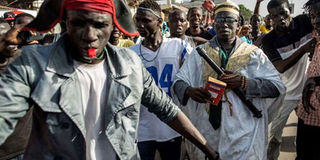Gambia back into abyss as Ghana stuns naysayers

A man dressed like incumbent President Yahya Jammeh (center) parades with supporters of the President-elect Adama Barrow in Serekunda on December 2, 2016. PHOTO | AFP
What you need to know:
- The poll was a do-or-die challenge for Akufo-Addo, who lost the presidential race in 2012 to Mahama.
- In a speech broadcast on state radio and television late on Friday, Jammeh announced that he would no longer concede defeat.
After 72 hours of anxiety as they awaited the results of the presidential poll, Ghanaians were relieved to learn that they had a new leader in the person of Nana Akufo-Addo.
Akufo-Addo, 72, who heads the New Patriotic Party emerged victorious after beating a handful of other candidates, including President John Mahama.
According to the electoral commission headed by Charlotte Osei, the remarkably resilient veteran politician romped to victory by winning 53.85 per cent of the votes, stealing the thunder from Mahama, who garnered 44.40 per cent.
The poll was a do-or-die challenge for Akufo-Addo, who lost the presidential race in 2012 to Mahama.
The tally for Mahama then was 50.7 per cent of the vote.
Akufo-Addo unsuccessfully contested the 2012 results in the supreme court.
Still, the 2016 poll in the world’s second biggest producer of cocoa was more than ever widely viewed as a high-stakes race between Mahama and Akufo-Addo.
The race was considered to be a litmus test of the stability of Ghana, one of Africa’s most secure democracies.
Particularly impressive was the fact that President Mahama was quick to congratulate a political adversary on his victory.
Unfortunately, the Ghanaian performance was in stark contrast to the despicable scenario evolving in The Gambia, another country that held an election recently.
Ironically, after the December 1 poll in the tiny West African country, incumbent Yahya Jammeh confounded his countrymen and the world when — even before the final results were out — he conceded defeat.
Jammeh even went on state television to congratulate Adama Barrow, the man who had beaten him in the race.
In typically African strongman fashion, Jammeh — in power since 1994 — has, however, made an about-turn.
In a speech broadcast on state radio and television late on Friday, Jammeh announced that he would no longer concede defeat.
IMPENDING UNREST
Citing “investigations” into the poll, which the unpredictable Jammeh alleged had revealed a string of “unacceptable errors” on the part of electoral authorities, he reneged on his earlier decision to cede power.
“I hereby reject the results in totality,” he said, and for good measure chillingly added: “Let me repeat: I will not accept the results based on what has happened.”
Amid reports that soldiers were seen placing sandbags in strategic locations across Banjul on Friday, the imperious Jammeh warned Gambians not to take to the streets.
Coming from a man widely viewed as the quintessential African dictator, the warning is bound to plunge the country into turmoil amid a demand for fresh elections.
Moreover, Jammeh’s volte-face was guaranteed to trigger unease among a wary populace.
Due to fear of impending unrest, citizens began buying and hoarding food even before December 1.
In the run-up to the Ghana elections, there had been fears of violence.
To the surprise of naysayers, however, the poll was marked by relative calm.
Not surprisingly, the European Union Election Observation Mission was reported as saying that somehow Ghana had “largely escaped the violence many had feared”.
Still, the mission pointed out that the Ghanaian electoral process was not without some alarming flaws.
It cited areas of concern, like “misuse of incumbency, including unequal access to state media, and unaccountable campaign financing” which it said the country should address in the future.
CONGRATS
All in all, the country was effusively praised, earning kudos for the way it conducted itself before, during and after the elections.
“Ghana has distinguished itself in the last two and a half decades with integrity and transparency,” proclaimed veteran US ambassador Johnnie Carson.
“It is a gold standard for democracy in Africa.”
Given the sickening events unfolding in The Gambia and the general chaos in an alarming number of hotspots on the continent, all Africans of goodwill should surely drink to that.





